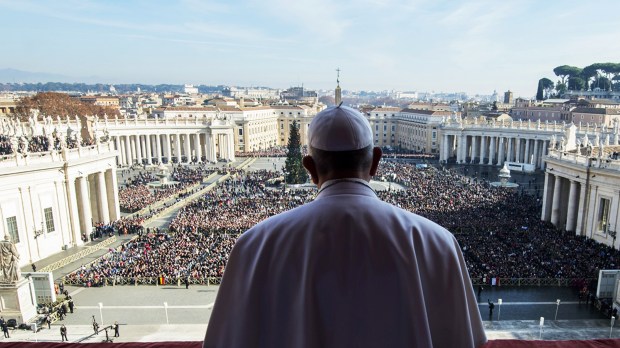Following a Christmas tradition, Pope Francis on Monday gave his “urbi et orbi” blessing from the balcony of St. Peter’s Basilica — his blessing to the city and to the world.
The Holy Father reflected: “Today, as the winds of war are blowing in our world and an outdated model of development continues to produce human, societal and environmental decline, Christmas invites us to focus on the sign of the Child and to recognize him in the faces of little children, especially those for whom, like Jesus, ‘there is no place in the inn.'”
He went on to mention a handful of regions around the globe most plagued by conflict.
The blessing urbi et orbi (to the city and the world) is traditionally given by the Bishop of Rome on Christmas Day and Easter Day. On this occasion, the Swiss Guard and the Gendarmerie of the Vatican are stationed on the steps of the basilica, to the right of the pontiff. Soldiers and police of the Italian Republic face them. This blessing is an opportunity for the pope to deliver a message of peace.
This year, the Middle East was particularly mentioned. His list began with the Holy Land – including Jerusalem – and the Israeli-Palestinian conflict. The Bishop of Rome expressed his hopes for the resumption of dialogue so this “wounded land” can finally achieve peace with a two-state solution. The pontiff also called for the “good will” of the international community.
Francis mentioned Syria, asking for a commitment to rebuild the social fabric of the country, irrespective of ethnic or religious affiliation. He spoke of Iraq, “wounded and divided” for 15 years, and then moved on to Yemen. This country suffers from a conflict “largely forgotten” by the rest of the world, causing famine and disease.
“We see Jesus in the children of Africa,” continued the pontiff, including those of South Sudan and the Democratic Republic of Congo, two countries the pope wants to visit, though any plans for such a trip have been postponed indefinitely due to the unrest. The pontiff also spoke of other African countries: Somalia, Burundi, the Central African Republic and Nigeria.
The face of Christ is also where peace and security are threatened, insisted Pope Francis. He named the Korean peninsula, calling for rebuilding “mutual trust.” Venezuela was then at the heart of the pontiff’s prayer, and then Ukraine.
Migrant children, “easy prey”
Jesus is also present in children whose parents can not offer them a safe and serene future because of lack of work, as well as in those who suffer from human trafficking or as child soldiers.
Migrant children, traveling alone in inhumane conditions, are also the face of the Lord, he said.
The Sovereign Pontiff ended by mentioning the children from Burma and Bangladesh, countries he visited in November-December. He urged the international community to adequately protect the dignity of minorities in this region, a clear allusion to the Rohingya, but also other minorities, including Christians, who are also victims of abuses of the Burmese army.
In concluding this Christmas message, Pope Francis invited the faithful to welcome Christ, God made man, to commit to “make the world more worthy of the children of today and tomorrow.”

